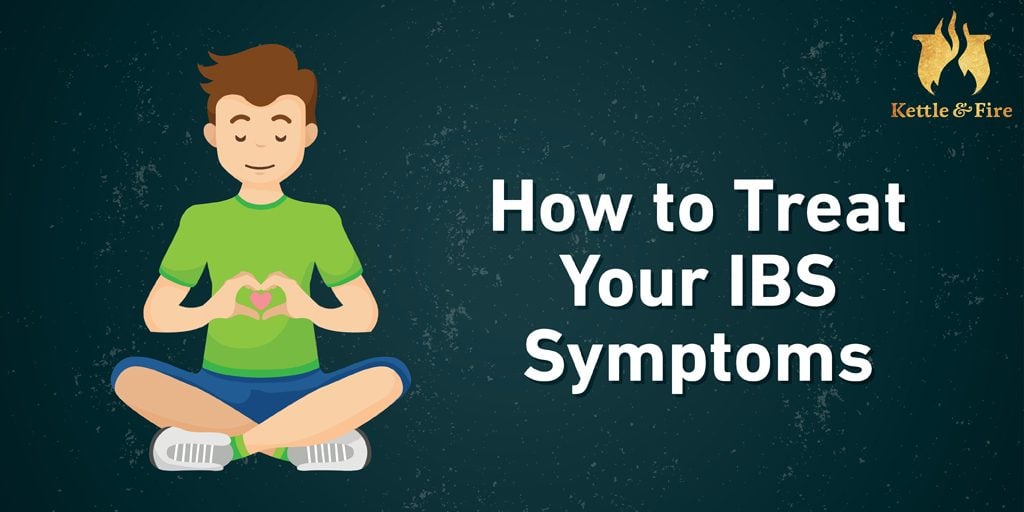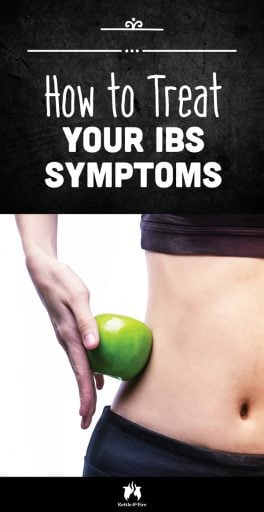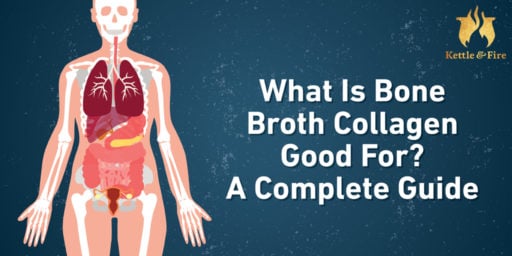How to Treat Your IBS Symptoms

Irritable bowel syndrome (IBS) is a little-understood yet prevalent digestive disorder in the United States. Between 10 and 20 percent of Americans report suffering from IBS symptoms, but the vast majority don’t actively seek treatment (1). While IBS is not life-threatening, nor does it cause cancer in the digestive tract, it affects health-related quality of life, as measured by a short survey used in gastrointestinal research (1).
Those who experience persistent symptoms report a lower score on health-related quality of life surveys. IBS symptoms can affect a person’s confidence, their ability to travel — even short distances away from home — and can worsen stress and anxiety levels (1). We’ll help you understand IBS, its symptoms, and diet and lifestyle changes to make IBS easier to live with.
What Causes IBS?
There are no strongly established causes of IBS. However, most medical professionals agree that IBS as a disorder of the gut-brain axis (2). The gut-brain axis — a feedback loop between the brain and the digestive system — depends heavily on communication of the microbiota (bacteria, yeast, and viruses) that live inside your body. Although research on the human microbiota and its relationship to our nervous system is still in its infancy, both direct and indirect evidence points to a relationship between a disrupted microbiota and IBS.
Changes in the microbiota might result from a severe bacterial infection, certain dietary habits that feed unsupportive bugs, or simple genetic variation. Disruption in communication on the gut-brain axis, whether due to a change in microbiota or something else, can result in overactive nerve sensations that lead to visceral pain, diarrhea, or constipation associated with IBS (3). Evidence shows that changes in the microbiota can alter IBS symptoms, which offers significant promise for the development of IBS treatments involving microorganisms (4).
What Are the Common Symptoms of IBS?
There is no single test for diagnosing IBS because it is a syndrome, which is harder to diagnose than a disease. Diseases are the body’s response to internal or external factors, such as chronic inflammation or a virus. A syndrome is a collection of signs and symptoms that could result from any number of underlying diseases or go unexplained, as is often the case with IBS.
There are commonly agreed-upon diagnostic criteria that originate from two schools of thought. There’s the Rome criteria and the Manning criteria. They have quite a bit of overlap, but Rome focuses on physical characteristics and attributes, while Manning focuses more on pain.
Rome Criteria
- At least 3 months of continuous or recurrent symptoms of the following:
- Abdominal cramping or discomfort:
- Relieved with bowel movement
- Associated with a change in frequency or consistency of stool
- Two more more of the following, at least 1/4 of the time:
- Altered stool frequency
- more than 3 bowel movements a day
- fewer than 3 bowel movements a week, categorized as chronic constipation
- Altered stool form (lumpy and hard or loose and watery stool)
- Altered stool passage (straining, urgency, or feeling of incomplete evacuation)
- Passage of mucus
- Bloating or abdominal distention
- Altered stool frequency
- Abdominal cramping or discomfort:
Manning Criteria
- Abdominal pain relieved by bowel movement
- Loose stools with pain
- More frequent stools with pain
- Bloating
- Passage of mucus
- Sensation of incomplete evacuation (5)
The Three Types of IBS
These criteria apply to all types of irritable bowel syndrome. There are three types: IBS-C (constipation), IBS-D (diarrhea), and IBS-M (mixed), which is also known as IBS-A (alternating).
In severe cases, other health problems, such as malabsorption, weight loss, or anemia are additional risk factors. Most IBS patients experience IBS-M, even if they tend toward one end of the spectrum or the other. The presence of both constipation and diarrhea in IBS patients makes it difficult to create adequate treatment plans that address both symptoms (6). We’ll go over treatments shortly.
Who is Affected?
IBS may have a genetic component. You’re more likely to be diagnosed if others in your family have also received an IBS diagnosis. IBS is also more likely to be diagnosed in patients under 35 years old. Doctors recommend that anyone over the age of 50 receive a colonoscopy if experiencing IBS symptoms in order to rule out any other potential causes, such as colon cancer, Inflammatory Bowel Disease, or other gastrointestinal disorders, such as celiac disease (3).
While reports differ in indicating whether IBS affects men and women equally, twice as many women seek treatment as men annually in the United States, so many studies assert that women are more affected than men (1, 6, 7). Some studies also indicate that women experience symptoms differently. The Office of Women’s Health asserts that women who have IBS might experience symptoms more severely during their menstrual cycles.
A study from the American Journal of Gastroenterology states that both pre- and post-menopausal women cited similar levels of discomfort and sensitivity to IBS symptoms, but also mentions that 40 percent of women claimed an increase of symptoms during their period (8). The study reports that women experience bloating, constipation, nausea, changes of taste and smell, unpleasant sensations on the tongue, muscle stiffness in the morning, greater food sensitivity, and side effects from medications more often than their male counterparts, regardless of age.
Does Diet Help?
We mentioned that certain foods may alter the makeup of the microbiota, but are there other correlations between diet and IBS? Most GI professionals agree that dietary changes can help keep IBS symptoms at bay, but the jury is still out on whether or not there’s a dietary cure (3). More research on dietary changes to support a healthy microbiota are needed.
An elimination diet can help a patient understand their food intolerances, but many find it difficult to stick to the process. Many professionals suggest identifying trigger foods by keeping a symptoms journal to track foods, subsequent symptoms, and bowel habits.
While individual sufferers might have unique food sensitivities, there are agreed-upon best practices in the area of dietary treatment for IBS for those who want a standard approach (9).
Foods to avoid include:
- High-FODMAP* (Fermentable Oligosaccharides, Disaccharides, Monosaccharides, and Polyols) foods (10, 11)
- Gluten
- Foods that cause gas (carbonated beverages, alcohol, caffeine, raw fruit, and certain vegetables, especially cruciferous veggies) (3)
- Dairy products (many IBS patients are lactose intolerant)
- Breads and cereals made of processed grains
- Protein-heavy meals
- Processed junk food (chips, cookies, and sugary snacks, especially those that contain high fructose corn syrup) (12)
*A low-FODMAP diet is not meant to be a long-term solution to IBS. If reducing these foods provides relief for you, there’s a chance that your symptoms are caused by an infection called SIBO (Small Intestinal Bacterial Overgrowth). This condition can be diagnosed with a lactulose breath test and treated with dietary changes and antibiotics that target the offending bacteria. FODMAPs should be reintroduced, one at a time, once symptoms subside.)
Foods to focus on for IBS-C:
- Foods high in insoluble fiber, such as leafy greens, fruit, beans, and whole grains. Introduce them slowly and gradually. This includes fiber supplements, with the aid of a doctor. Shoot for 20 grams of fiber per day.
- Foods that promote healthy bowel movements, such as prunes and prune juice.
- Six to eight glasses of water per day (7, 12).
- Gut-nourishing foods such as bone broth and fermented veggies and juices.
Foods and practices to focus on for IBS-D:
- Eat foods high in soluble fiber, such as whole grains and peeled or dried fruit
- Drink water at least an hour before a meal rather than during a meal
- Six to eight glasses of water per day — re-hydration is key for those with IBS-D
- Don’t combine hot and cold foods and drinks together in the same meal (7, 12)
Large meals can also exacerbate IBS symptoms, so try to eat slowly, chewing well, and eat smaller meals. Focus on your food and avoid distracted eating (like eating in the car or in front of the TV). If needed, eat four to five smaller meals throughout the day if three smaller meals isn’t enough food for you (12).
How Stress Plays a Role in IBS Symptoms
Overall lifestyle plays a key role in managing IBS. Many patients with IBS report higher incidence of stress, anxiety, panic, and depression (13). Stress directly affects the gut-brain axis we mentioned earlier (4). For those IBS sufferers who experience excessive pain with their condition, these feelings can become part of a vicious cycle, so making lifestyle changes to manage stress is critical for IBS patients.
Getting on a regular sleep schedule and ensuring adequate, quality sleep is a great place to start. Talking to a mental health professional and developing a mindfulness practice are also options to help alleviate stress and develop skills to improve resilience over time (14). It’s also important to prioritize exercise. Movement helps relieve digestive symptoms and pumps your blood stream full of endorphins that can help ward off feelings of depression and anxiety.
If you’re feeling overwhelmed, tap into your network to ask for help or seek counsel. Specific types of therapy have proven effective in managing the stress and anxiety that accompanies IBS, including cognitive behavioral therapy, dynamic psychotherapy, hypnotherapy, biofeedback, and relaxation therapy (7, 12).
Having a support network in place is critical for overall stress reduction. Ask your doctor or therapist about IBS support groups, and lean on your friends and family when possible to help ease your load. A body of research is emerging that implicates loneliness as a major factor in depression and poor health outcomes, so finding that support network is more critical than ever (15, 16).
Should You Seek Medical Treatment?
If you’re reading through our list of symptoms and feeling like they describe you, seek medical advice to find out of you have IBS or another type of GI disorder. You have a lot of options for treatment in addition to the diet and lifestyle changes we laid out in the previous section.
Depending on your particular set of symptoms and circumstances, conventional treatments include specific antibiotics, antidepressants, vitamin D supplements, antihistamines, stool softeners, laxatives, and fiber supplements (5). Amitiza and Linzess are two IBS-specific prescriptions that help with constipation and cramping if all else fails. Alternative therapies include acupuncture and supplementing with peppermint oil (12, 14).
Your treatment plan will be as individual as you are, but you have to start somewhere. With these guidelines, hopefully you’ll soon find the relief you’re looking for.
Pin this article for later:





